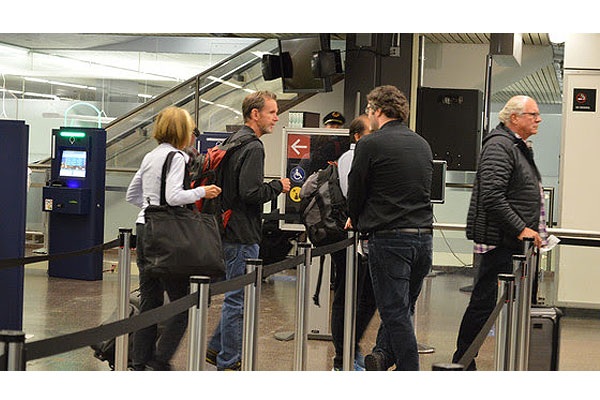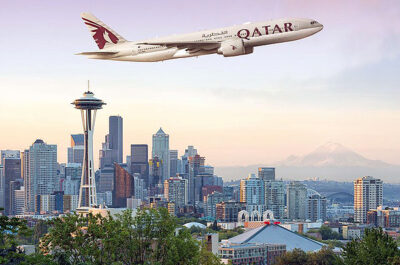Commission calls for no new implementation of facial recognition prior to development of new enforceable policies Passengers arrive in the US at SEA Airport.
The Port of Seattle became the first port in the United States to adopt principles to ensure that implementation of public-facing facial recognition technology is clearly justified, equitable, and transparent. Commissioners created a working group, which by March 31, 2020 will develop these principles into policies that can be clearly enforced and measured. Commissioners also clarified that no biometric technology shall be implemented at Port facilities until Commissioners formally consider working group recommendations and develop policy by June 30, 2020.
This month, United States Customs and Border Protection (CBP) notified the Port of Seattle in a letter that it agrees to the Port’s principles and will follow them in federal implementation of facial recognition technology at Port facilities.
The Port developed the principles and working group strategy after inviting comment from airlines, cruise lines, federal agencies, and civil liberty and immigrant rights groups during public meetings in September and October.
“We know of more than 20 other airports that have implemented facial recognition technology, but no other Port has undergone a public process to ensure that implementation would protect passenger rights, and be limited, transparent, and ethical,” explained Port of Seattle Commission President Stephanie Bowman. “We feel that our community expects more than to have this kind of technology rolled out without any public discussion or input. When this Commission adopts policies in 2020 we will have and have the opportunity to create the nation’s best practices for public-facing biometrics.”
“Biometric authentication” – otherwise known as “biometrics” – uses biological measurements or physical characteristics (such as facial recognition) to identify individuals. It can make travel safer and more efficient by speeding up passenger processing. However, it also raises concerns about privacy, racial equity, cybersecurity, civil liberties and unforeseen uses that raise ethical questions.
The Port is only considering facial recognition technology for use in confirming identity during passenger processing, replacing current manual passport control and boarding pass processes for international flights. The Port does not condone biometrics for “mass surveillance” – use of facial recognition on large groups of people without a lawful purpose.
The Port is acting ahead of a national rise in public-facing facial recognition technology deployment over the next few years by its private sector and federal partners. Currently, CBP uses facial recognition technology for international arrivals processing at 11 U.S. airports and 6 cruise terminals, while airports and airlines have implemented facial recognition for international departures at 20 airports. Airports currently using facial recognition technology include Atlanta, Dulles, Ft. Lauderdale, Houston, JFK, Las Vegas, LAX, Miami, Orlando, San Diego, San Jose, and Portland, Oregon.
Port of Seattle Principles for Public-Facing Biometric Technology
According to the principles adopted by the Port Commission, the implementation of public-facing facial recognition technology at Port of Seattle facilities must be:
- Justified – Biometrics should be used only for a clear and intended purpose and not for surveillance on large groups without a lawful purpose.
- Voluntary – Reasonable alternatives should be provided for United States citizens who do not wish to participate through an opt-in or opt-out process.
- Private – Data should be stored for no longer than required by applicable law or regulations and should be protected against unauthorized access or use.
- Equitable – The technology should be reasonably accurate in identifying people of all backgrounds, and systems should be in place to treat mismatching issues.
- Transparent – Use of biometrics should be communicated to visitors and travelers.
- Lawful – Use of biometrics should comply with all laws, including privacy laws and laws prohibiting discrimination. Reports on the performance and effectiveness of the technology should also be made public to ensure accountability.
- Ethical – Port staff and partners should act ethically when deploying technology or handling biometric data.
The Port will establish a working group to recommend and enforce polices for passenger processing and a mechanism for evaluating performance prior to the implementation of any new facial recognition technology at Port facilities. The policy recommendations will be delivered to the Port Commission by the end of March 31, 2020. Commissioners will formally adopt these policies by June 30, 2020.
Public Engagement on Biometric Technology
In 2019 the Port Commission began a public process to prepare for broader implementation of public-facing facial recognition technology at Port facilities, expanding public awareness on how this technology works, how it might be used, and key policy and regulatory issues to address.
The Port heard from a range of stakeholders at two study sessions in September and October 2019. The first study session focused on how private companies use facial recognition technology to improve efficiency and service. The Port also heard from civil society groups that raised concerns about threats to privacy and data protection, and inherent bias in the technology.
The second study session focused on the federal implementation of facial recognition biometrics as well as how Port staff has prepared for the adoption of biometrics technology at its facilities.
Public-Facing Biometrics at Port of Seattle Facilities
CBP has notified the Port that it will open Sea-Tac’s new International Arrivals Facility with full implementation of so-called “biometric entry,” using facial recognition for both immigration and customs screening of almost all arriving international passengers through the Federal Inspection Services (FIS) area. Facial recognition and a new “Simplified Arrivals” process will allow CBP to process more passengers faster, with less staff. The process also allows passengers to pick up their bags first and only interact once with CBP.
CBP does not require U.S. citizens to have their pictures taken; such travelers who do not wish to participate in a facial comparison process can request an alternative means of verifying their identities and documents.
The Port will consider airline and cruise line applications for using facial recognition boarding processes on a case-by-case basis, only after Commission policies are in place by June 30, 2020.
Tatiana is the news coordinator for TravelDailyNews Media Network (traveldailynews.gr, traveldailynews.com and traveldailynews.asia). Her role includes monitoring the hundreds of news sources of TravelDailyNews Media Network and skimming the most important according to our strategy.
She holds a Bachelor's degree in Communication & Mass Media from Panteion University of Political & Social Studies of Athens and she has been editor and editor-in-chief in various economic magazines and newspapers.




























































































































































































